Key takeaways:
- Rescue volunteering is about building relationships, not just with animals but within the community, which fosters compassion and advocacy for animal welfare.
- Emotional challenges, like grief and compassion fatigue, are inherent in animal rescue work; open communication and self-care are essential for overcoming these hurdles.
- Effective rescue strategies include community collaboration, structured planning for operations, and continual reflection to improve outcomes.
- Personal connections with animals and fellow volunteers enrich the experience, emphasizing the importance of teamwork and shared commitment to the cause.
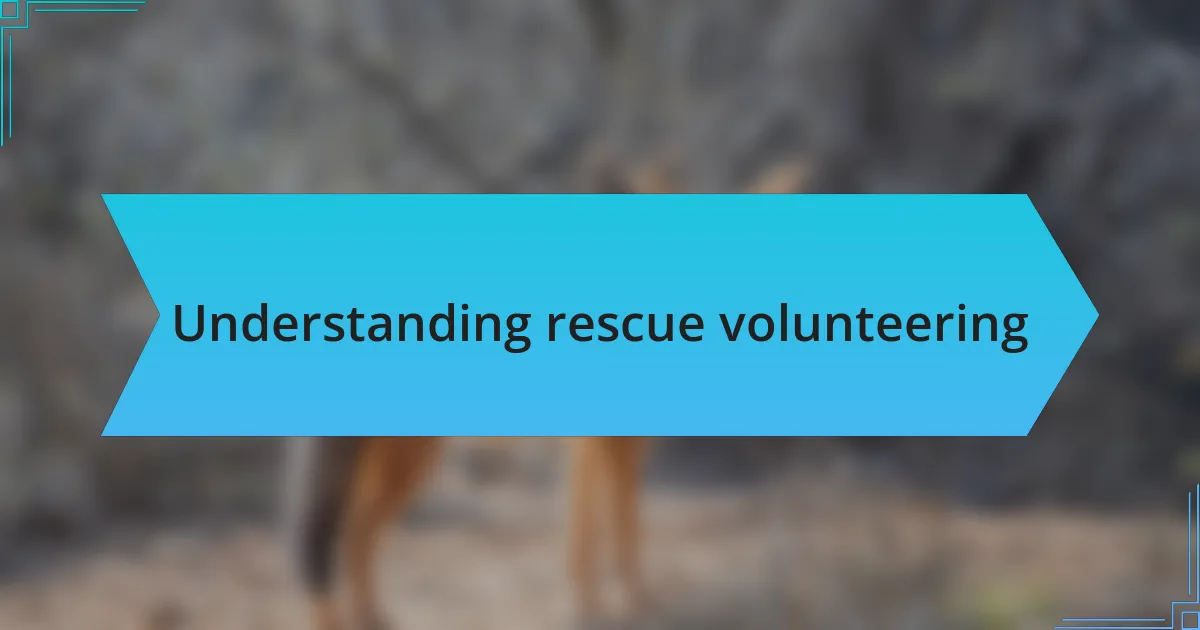
Understanding rescue volunteering
When I first joined the ranks of rescue volunteers, I was struck by how diverse the roles can be. It isn’t just about saving animals; it’s about building relationships—both with the animals and the community. How often do we get a chance to connect with those who share a similar passion for welfare, united by the mission to give voiceless creatures a second chance?
One unforgettable moment that has stayed with me was when I helped rehabilitate a timid dog named Max. His journey from fear to trust showcased the power of patience and compassion in this work. In moments like that, I couldn’t help but wonder: isn’t it incredible how a little love can transform lives? Rescue volunteering goes beyond tasks; it’s about witnessing the resilience of animals and, in turn, finding resilience within ourselves.
Understanding rescue volunteering means recognizing that it involves emotional highs and lows. The joy of a successful adoption can be exhilarating, but the heartbreak of losing an animal due to neglect can be profoundly painful. I often ask myself: What keeps me going during those tough times? The answer lies in the knowledge that every small act—every moment of care and dedication—can ignite hope for both the animals and the advocates who fight for them.
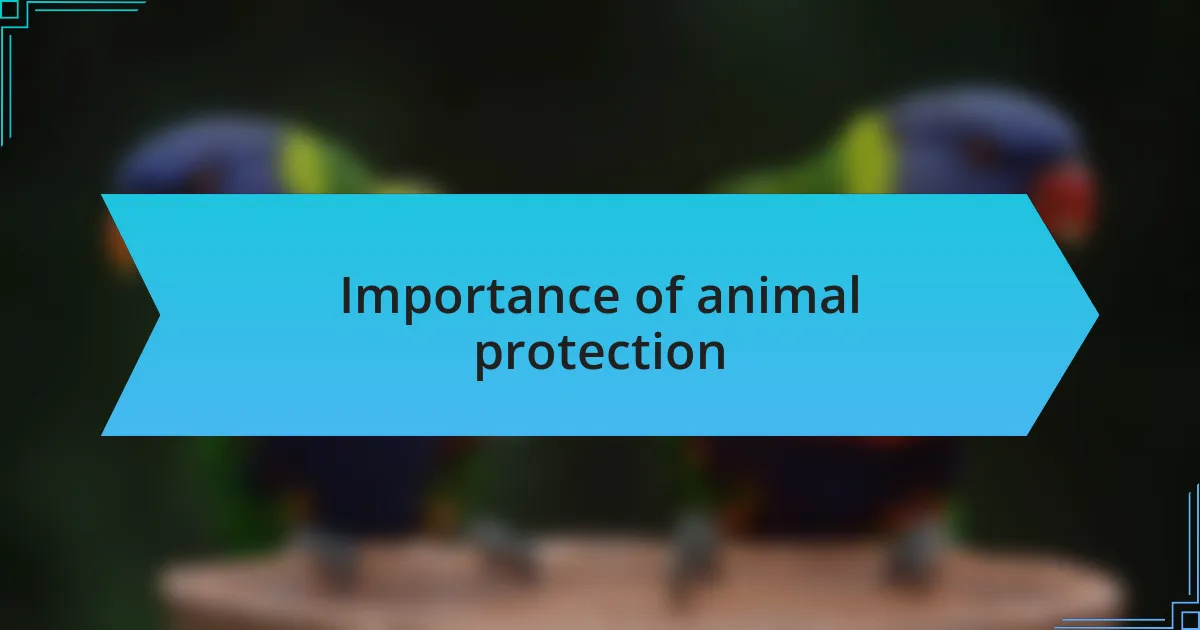
Importance of animal protection
The importance of animal protection is evident when we consider the sheer vulnerability of those creatures. For me, witnessing animals suffer in silence is unbearable. I remember a day spent at a shelter where I met a group of abandoned puppies. Their sweet faces, filled with uncertainty, made me realize that our collective responsibility goes beyond mere shelter; it’s about advocating for their rights and welfare.
Each animal we rescue tells a story of resilience, often marked by suffering that reflects broader societal issues. I once met a cat named Bella who endured neglect for years, yet she still sought companionship. Her spirit reminds me that protecting animals is not just an act of kindness; it’s a crucial stand against the systemic issues that lead to their plight. How can we turn a blind eye when so many souls depend on our empathy and action?
Furthermore, animal protection plays a pivotal role in fostering community compassion. When I engage with fellow volunteers, I notice their passion igniting a sense of shared commitment, a ripple effect that encourages awareness and change. I often wonder: if everyone took a moment to consider the impact of their choices on animals, how much brighter our world could be? The bonds we form while championing animal welfare ultimately strengthen our communities and enrich our lives.
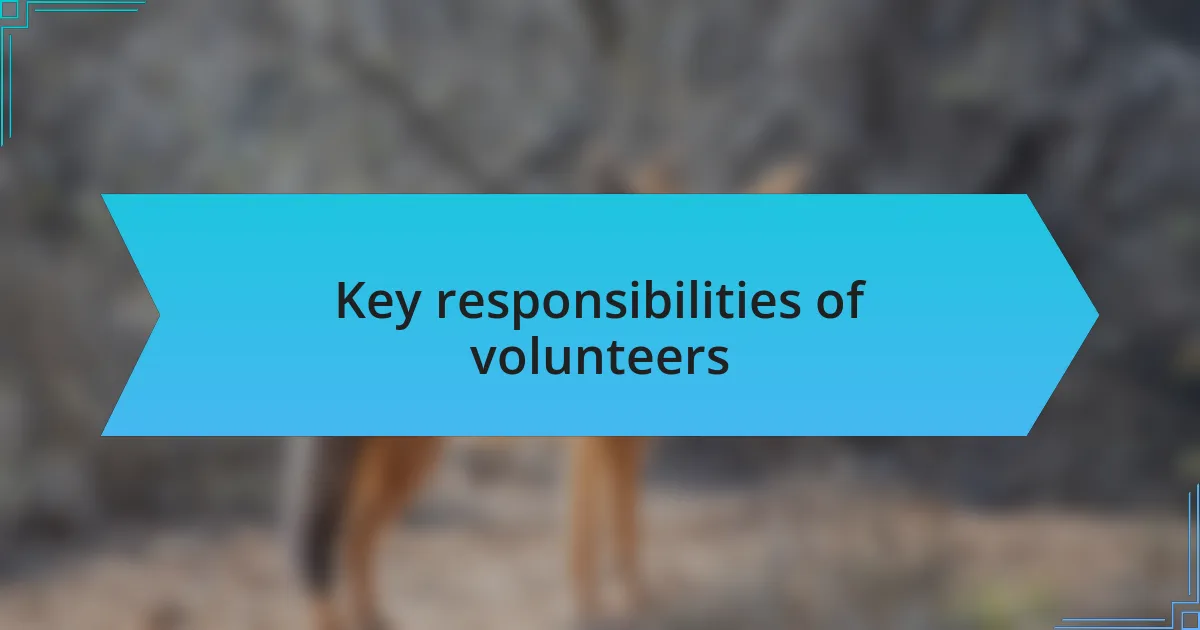
Key responsibilities of volunteers
Volunteers play a crucial role in the day-to-day operations of animal shelters. I remember my first day feeding the animals; I was surprised by how quickly a simple task could feel so rewarding. It’s not just about filling bowls—it’s about connecting with each animal, understanding their needs, and providing them with the love they so desperately crave.
Another key responsibility lies in fostering animals and preparing them for adoption. I once had the honor of caring for a timid dog named Charlie, who initially flinched at every sudden movement. Over time, as I patiently built his trust, I witnessed him transform into an affectionate companion. Isn’t it heartwarming to consider how our dedicated efforts can help animals like Charlie find their forever homes?
Additionally, volunteers are often the voice for animals in need through advocacy and community outreach. I recall organizing an awareness event and feeling a sense of purpose as we shared the importance of spaying and neutering pets. Seeing community members engage and ask questions made me realize that our passion can spark change. What could be more fulfilling than empowering others to take action alongside us?
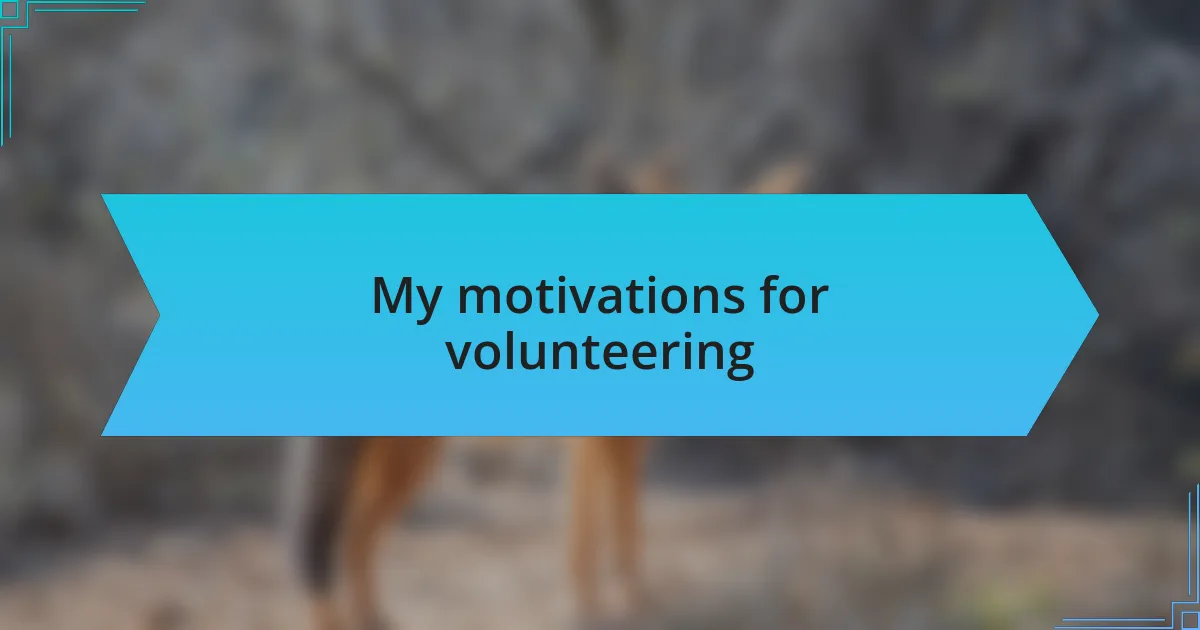
My motivations for volunteering
Volunteering for animal rescue fills me with a sense of purpose that’s hard to put into words. It began when I stumbled upon a stray kitten while jogging one morning. That little furball, with its wide, pleading eyes, struck a chord deep within me. I knew I had to act, and rescuing that kitten pushed me to look for ways to make a more significant impact in the lives of animals.
Another motivation comes from the moments of connection with the animals. Just last week, I spent time with a pair of elderly dogs who had been abandoned. Their gentle presence and wagging tails brought me such joy, reminding me that my small efforts can lead to spontaneous happiness. I often wonder, how many more lives could I touch if I continued to dedicate my time to these beautiful creatures?
Finally, the community aspect truly inspires me to keep going. Sharing my experiences and learning from fellow volunteers has enriched my life in countless ways. Building friendships with like-minded individuals, united by a common goal, fuels my enthusiasm. In these moments, I recognize that I’m not just volunteering; I’m part of a larger movement dedicated to making the world a kinder place for animals. Can anything be more rewarding than that?
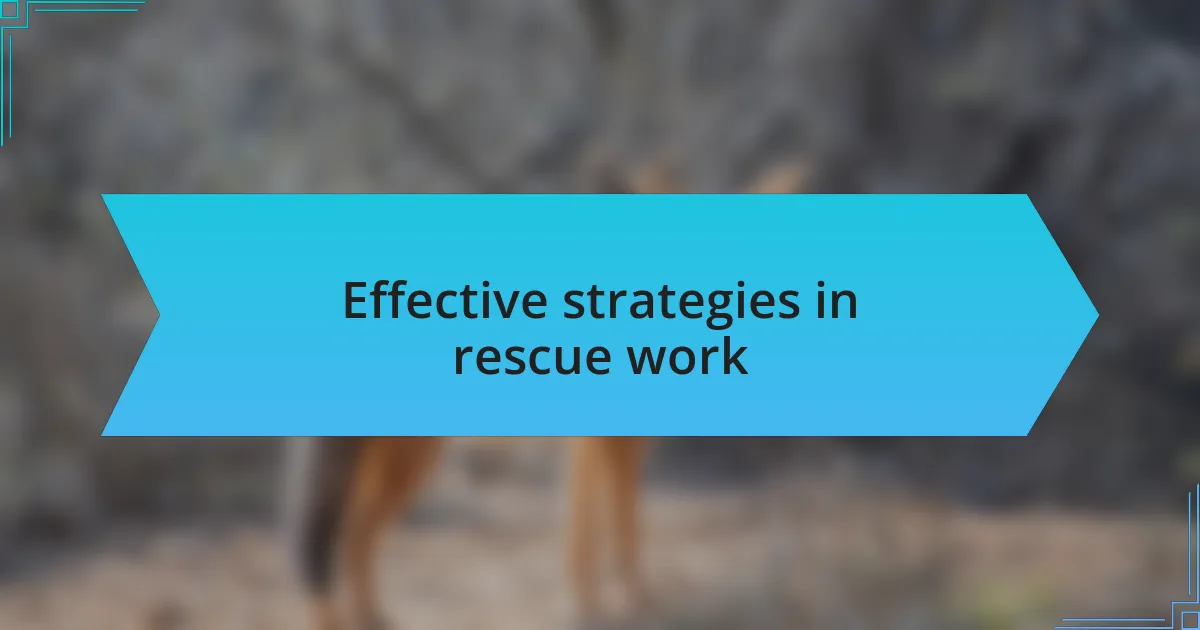
Effective strategies in rescue work
Effective strategies in rescue work often stem from building strong relationships within the community. I remember the first large-scale rescue operation I participated in; we teamed up with local businesses willing to donate supplies. This collaboration not only boosted our resources but also spread awareness about our mission. Have you ever wondered how much more we could achieve when communities unite for a common cause?
Another crucial approach is creating a structured plan for each rescue operation. During one memorable rescue, we devised a checklist that included roles for everyone involved, from capturing the animals to transporting them safely. This not only minimized chaos but also ensured that every animal received the attention it needed without delays. Isn’t it interesting how a little organization can transform a daunting task into something manageable?
Lastly, tracking our progress is vital for continual improvement. I once started keeping a journal of our rescues, noting what worked and what didn’t. This simple practice helped our team refine our strategies, ultimately leading to more successful outcomes. How can we learn from our experiences if we don’t take the time to reflect on them? Sharing these insights during team meetings also fosters a culture of open communication and growth.
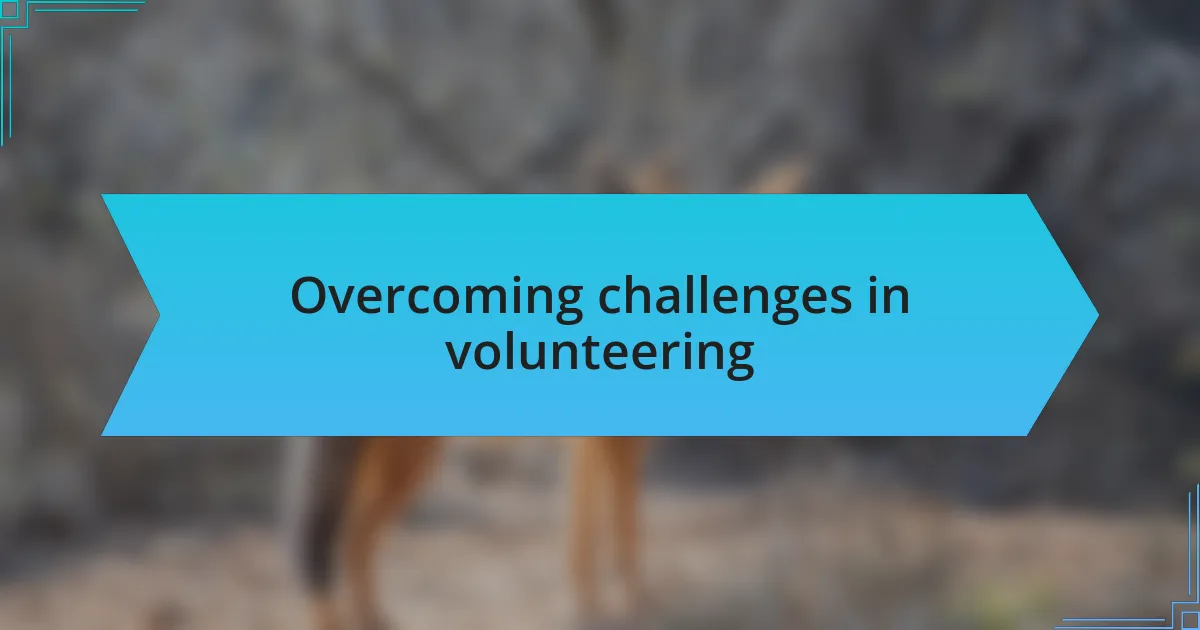
Overcoming challenges in volunteering
Volunteering in rescue can present emotional challenges that are often hard to navigate. I vividly recall a day when we faced the heartbreaking reality of an animal that didn’t make it despite our best efforts. It reminded me how crucial it is to allow ourselves to grieve and share those feelings with our team. Have you ever felt overwhelmed by compassion fatigue? Recognizing and processing these feelings can help us move forward and continue our important work.
Communication is another area where challenges can arise. In one instance, miscommunication during a rescue led to confusion about roles, which ultimately stressed the team. This experience taught me the importance of clear and constant dialogue; I now advocate for daily check-ins to ensure everyone is on the same page. Have you ever experienced a situation where a simple conversation could have changed the outcome?
Time management can also pose hurdles. There were days when the demands felt insurmountable, and I often found myself sacrificing personal time. However, I learned to set boundaries and prioritize self-care, which in turn made me a more effective volunteer. Isn’t it funny how taking a step back can sometimes be the best way to move forward?
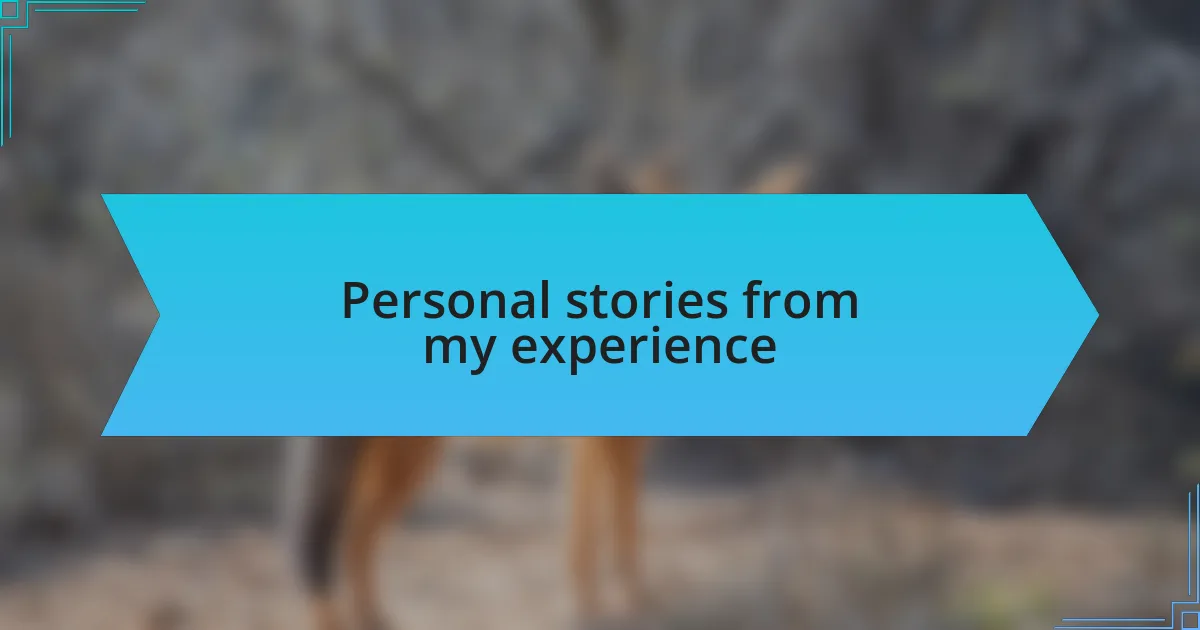
Personal stories from my experience
One memorable experience that stands out to me was the time we rescued a litter of abandoned puppies. I remember holding the tiniest one, trembling in my hands. It struck me how fragile life can be and the immediate responsibility we shoulder as rescuers. In that moment, I realized the importance of each animal’s story—they deserve our attention and care. Have you ever felt a profound connection to an animal that changed your perspective on life?
Another significant lesson came during a particularly overwhelming weekend where we were inundated with calls about stray cats needing help. At first, I felt a rush of panic, thinking we could never manage it all. But then I remembered the strength of our team. We divided the tasks, and through collaboration, we not only succeeded but shared countless laughs along the way. Isn’t it remarkable how working together can lift us from feelings of helplessness?
Lastly, I’ve often found comfort in the bonds formed with fellow volunteers. One evening, while cleaning kennels, a simple conversation turned into a heartfelt sharing session about our reasons for being there. It was a reminder that we’re not alone in this journey; we’re part of a community that understands the highs and lows of rescue work. Have you ever found solace in a shared experience with someone who gets it? Those connections fuel my passion and commitment to rescue.